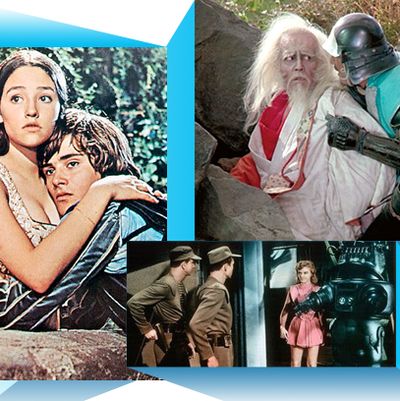
This weekend, as you search for a movie to watch, you can either go see the latest adaptation of Romeo and Juliet or stay home and pick one of approximately 14 billion options available to stream over a variety of services, be it Netflix, Hulu, Amazon, On Demand, or other sites. Every Friday, Vulture tries to make life easier by narrowing it down to a handful of heartily recommended options. This week, we stage a controversial love story, a science fiction classic, and a Japanese epic that twists the Bard in all the right ways.
Ran
Akira Kurosawa states in interviews that when he was first developing his feudal Japan epic, it had nothing to do with Shakespeare’s King Lear. It was only after dwelling on the legend of territorial lord Mōri Motonari, who taught his three sons the power of strength in numbers by challenging them to break three arrows at once, that he saw the Bard’s wok in the unrelated tale. Riffing on Lear gives Tatsuya Nakadai the freedom to inhabit absolute grandness. His fatherly leader experiences the ultimate downfall, familiar, yet on a scale beyond all comprehension. Kurosawa fills the screen with dazzling imagery, but like all great Shakespeare adaptations, the scenery and flourishes rest on the power of an actor’s cadence. Nakadai, donning a frightening makeup job, never succumbs to the movie’s grand scale … even as his character is consumed. (Available on Amazon Prime)
Romeo & Juliet (1968)
The latest version of Shakespeare’s classic love story is unforgivably chaste. It’s about two infatuated teenagers — the passion should be bubbling over! Thankfully, we’ll always have Franco Zeffirelli’s ‘68 version, known for its controversial nudity of 16-year-old Olivia Hussey and appreciated for its honest portrayal of teen love. The movie is crafted for a younger audience — even the classic music theme is downright Disney bubbly — but Zeffielli doesn’t skimp on the sexuality. The couple’s first encounter is full of cleavage and heavy breathing — taboo territory that manages to modernize the material. In an age of free love, that’s what young people would be doing. Great Shakespeare uses the text to comment on the current times, and there’s no better example than Romeo & Juliet. (Available on Netflix)
Hamlet
When Laurence Olivier’s Oscar-winning version is locked up on for-purchase streaming, turn to the next best thing: Kenneth Branagh’s four-hour iambic spectacle. While Branagh brought and would bring many of Shakespeare’s plays to screen — the kick-ass Henry V, the underrated As You Like It — Hamlet remains his masterpiece, shot on luscious 70mm and assembling a perfect cast (Billy Crystal, Gérard Depardieu, and Charlton Heston in one movie?!) to enliven the Bard’s epic speak. Yes, Branagh’s a bit old to play the Prince of Denmark, and yes, he could lighten up on the canted angles. But there’s a reason he was recruited for Thor. Branagh knows how to pace and stage Shakespeare. He’s in full control as both actor and director, delivering a Hollywood effort finally worthy of the playwright’s legacy. (Available on Amazon Prime)
Forbidden Planet
Shakespeare in space … why is this not a common practice? The psychedelic riff on The Tempest swaps out sea-faring vessels for starships, a magical island for the planet Altair IV. Leslie Nielsen stars as Commander John J. Adams, who lands on the mysterious world to find a whole lot of weird. There’s ancient technology, invisible creatures, and Robby the Robot — a now-iconic sci-fi image. Before science took its dark turn into realism in the seventies, the popping colors and electronica score of Forbidden Planet hit a pinnacle for the genre. Building off time-honored source material didn’t hurt. (Available on Amazon Prime)

